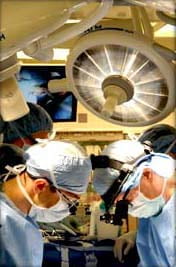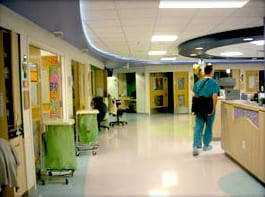Fellows are immersed in a dynamic clinical pediatric cardiology service at St. Louis Children’s Hospital and play a central role within the cardiology team in both in-patient and out-patient settings. Rotations through all subspecialties within pediatric cardiology occur in predominately two-week blocks. The standard schedule of rotations will give fellows a solid foundation in imaging and interventional skills, arrhythmia management, outpatient evaluation and in the care of inpatients, including postoperative cardiac patients.
All rotations take place in St. Louis Children’s Hospital — a 402-bed hospital founded in 1879 that is one of the nation’s premier children’s hospitals. St. Louis Children’s Hospital is the pediatric teaching hospital for Washington University School of Medicine and recognized as a top pediatric hospital by U.S. News & World Report.
The CICU at St. Louis Children’s Hospital is a state-of-the-art, 16-bed, dedicated unit that provides all forms of cardiovascular intensive care for children and adults with congenital and acquired cardiovascular diseases. Approximately 400 patients are admitted to the CICU per year, with 35% of admissions for post-operative care, reflecting our internationally renowned heart failure/transplant program. Patients range in age from premature neonates to adults, and patient complexity and acuity are amongst the highest in the nation. A full range of clinical services is available, including mechanical circulatory support for heart failure patients with ventricular assist devices (Berlin Heart, HeartMate III, PediMag and CentriMag), the paracorporeal lung assist device system (Novalung and Quadrox oxygenators) and ECMO. Care is provided by a joint team comprised of faculty and trainees from critical care medicine, cardiology and cardiothoracic surgery. The critical care faculty are in house 24/7.
Cardiology fellows rotate in the CICU primarily during their second year (eight weeks) and also during their third year (two weeks) and are actively involved in all aspects of ICU care, including ventilator management, sedation, use of vasoactive and anti-arrhythmic drugs and performing bedside procedures. Through the demanding experience in this intense environment, fellows gain a greater understanding of cardiac pathophysiology, cardiopulmonary interactions, cardiac pharmacology and the effects of cardiac surgery. Several fellows have arranged combined fellowships in pediatric cardiology and critical care leading to dual-board eligibility.
Please refer to division’s page under Clinical Care.
The consult service rotation is an opportunity for our fellows to act with graduated autonomy during their three years of fellowship. The consult fellow handles both inpatient and outside hospital cardiology related requests for consultation. The consult fellow role encourages trainees to assess patients and their various data independently before discussing with the supervising attending physician. For many of our fellows, this rotation gives them a glimpse of “the real world” prior to graduation and allows them the opportunity to refine their skills in physical exam, telemetry review, interpretation of ECG/echocardiogram/cath data and interdisciplinary communication.
Fellows enjoy starting their training with a hands-on ECHO “bootcamp” where they learn the basics of cardiac ultrasonography before starting any clinical work. Our training program believes the ability to perform a high-quality ECHO is invaluable when it comes to learning the art of interpretation. As the fellows’ scanning skills improve, they transition into more advanced scanning (e.g. transesophageal) and interpretation. An additional one to two months is assigned during the second and third years of fellowship where the focus is primarily on advanced imaging (e.g. transesophageal, 3D and fetal echocardiography) and improving efficiency with basic transthoracic scanning and interpretation. Fellows on ECHO rotation also review the charts and images for patients being presented at the weekly Heart Center Surgical Disposition Conference. This gives the fellow a unique opportunity to distill a wide variety of clinical data into a summarized assessment and recommendation for complex patients with the guidance of faculty.
The pediatric EP team at Washington University has several service lines, including inpatient consults, diagnostic and therapeutic procedures and outpatient medicine, along with a robust research and advocacy program. As a moderate-large EP program in the Midwest, the EP team performs over 200 cases per year (including diagnostic EP studies, transcatheter ablations, and device implants) and see more than 1,000 clinic visits per year in EP clinics (including our specialized multidisciplinary Inherited Arrhythmia Clinic, Telemedicine Clinic and Device Clinic).
Under the supervision of an EP attending physician, the first-year fellow spends one month on the EP rotation and functions as a consultant for all inpatients and selected outpatients with arrhythmias. The fellow is responsible for coordinating patient management of arrhythmias including diagnosis and pharmacologic treatment, participation in esophageal electrophysiology studies, cardioversions and exercise studies and daily review and interpretation of electrocardiograms, Holter studies and event monitor transmissions. Fellows participate in interventional and surgical EP cases as well, such as radiofrequency ablation procedures and pacemaker placements.

The pediatric heart failure and transplantation program at St. Louis Children’s Hospital (SLCH) began performing pediatric heart transplants in the 1980s with over 500 heart transplants performed since its inception. SLCH is nationally recognized as a large volume transplant center with expertise in complex, high-risk patients with advanced heart failure, particularly those with congenital heart disease. SLCH also has a long history of use of ventricular assist devices (VADs) for refractory heart failure including outpatient and inpatient support with temporary and durable devices. Our team receives referrals from the St. Louis region as well as nationally.
During fellowship, categorical pediatric cardiology fellows routinely care for HFHT patients throughout the spectrum of care, including imaging, cardiac catheterization and inpatient service. Fellows spend an additional dedicated month with the HFHT service with both inpatient and outpatient care. Fellows are expected to be comfortable with the diagnosis and management of acute and chronic heart failure, indications and management of VADs, failed congenital heart disease palliation from infants to young adults, indications and peri-operative management of heart transplantation and long-term outcomes and complications of pediatric heart transplantation.
Our cardiology fellows dedicatedly care for cardiac patients who are admitted to our heart center. During their rotation in the heart center, their focus is mainly on providing cardiac consulting services in the cardiac ICU. This ensures their presence during crucial conversations and decision-making processes, as well as their active involvement in managing acute cardiology concerns, including new patient admissions, bedside echocardiogram, temporary pacemaker management, and more.
When fellows are assigned to the transitional care unit, they have the opportunity to round on patients with various acute care cardiology issues. This experience allows them to enhance their skills as attending physicians, take charge of their own responsibilities, and further develop their leadership abilities.

The call schedule gives fellows experience in the full range of urgent problems in pediatric cardiology and a focused experience in intensive cardiac care in the second and third years. Fellows take in-house call in the form of a night-shift rotation. The night-shift fellow (6:30 p.m. – 6:30 a.m.), under the supervision of the inpatient cardiology attending, is responsible for overnight management of the cardiac inpatients on the cardiology unit, for urgent consultations (in-house and from outside hospitals) and overnight echocardiograms.
Cardiac intensive care unit (CICU) night shift is separate and is covered by second and third year fellows during their CICU rotation.
Fellows participate in evaluation of outpatients referred to the cardiology clinics at St. Louis Children’s Hospital and in satellite outreach clinics throughout Missouri. Each fellow is assigned to clinic under the same cardiology attending preceptor for six-month blocks. Fellows also attend intermittent satellite clinics throughout their training. Goals for this experience are to hone cardiac-focused history-taking and physical examination skills; to be able to independently assess patients referred for common problems such as murmurs, syncope, chest pain, and rule out or diagnosis cardiac disease in these patients; to coordinate care and longitudinal follow-up for patients with congenital and acquired heart disease; and to effectively communicate with referring physicians.
Sample rotation schedule
This schedule represents a general guideline and is adapted to the individual fellow’s goals and training needs. Additional elective time in cardiac catheterization, advanced imaging, adult congenital heart disease, transplant cardiology and electrophysiology is available during research/elective months.
| First year | Heart Center: 8 weeks Night shift: 7 weeks Consults: 7 weeks TCU: 2 weeks Cardiac catheterization: 6 weeks Echocardiography: 7 weeks Electrophysiology: 4 weeks Heart Failure/transplant: 4 weeks Research/elective: 8 weeks |
|---|---|
| Second year | Heart Center: 6 weeks Night shift: 6 weeks Consults: 6 weeks TCU: 4 weeks Cardiac catheterization: 6 weeks Echocardiography: 6 weeks CICU: 8 weeks Research/elective: 10 weeks |
| Third year | Heart Center: 3 weeks Night shift: 4 weeks Consults: 4 weeks TCU: 2 weeks Echocardiography: 5 weeks CICU: 2 weeks Research/elective: 30 weeks |
Conference/didactic curriculum
Clinical experiences are complemented by a series of teaching conferences within our division. These conferences are held daily in a variety of formats and venues — some led by attendings and others by fellows. In both didactic and interactive sessions, fellows receive weekly education on core cardiology subjects and research fundamentals, discuss echo and angiography cases, present cardiology cases for discussion of medical and/or surgical management and review inpatient cases. Monthly conferences include Morbidity and Mortality conference, Journal Club and Cardiac ICU case conference and Pathology conference. The didactic curriculum is set up on an 18 topic rotating block that predominatly focuses on specific heart lesions to provide a comprehensive understanding of that topic. During a 3 year fellowship, each fellow will get the entire curriculum twice.
Vacation/time off
At Washington University, we understand the importance of work-life balance for our trainees. As part of the Washington University GME consortium, vacation time and time off policies are determined by the discretion of both entities. Currently, fellows are granted 4 weeks of vacation and personal days. These can be taken in 1-2 week blocks or shorter intervals for personal days, based on the program leadership’s approval.
In addition to vacation time, trainees are provided with 2 weeks of sick days. Furthermore, they are eligible for an additional 2 weeks of leave for parental, caregiver, or medical purposes once during their training program. We also offer unpaid FMLA and non-FMLA leave options for trainees after they have exhausted all other paid time off.
Our School of Medicine
Our students learn from master clinicians and researchers while pursuing their studies in a wide array of academic departments and programs. Students select Washington University for the culture of camaraderie and support, a flexible curriculum and outstanding opportunities after graduation. Our programs are considered to be among the very best in the nation.